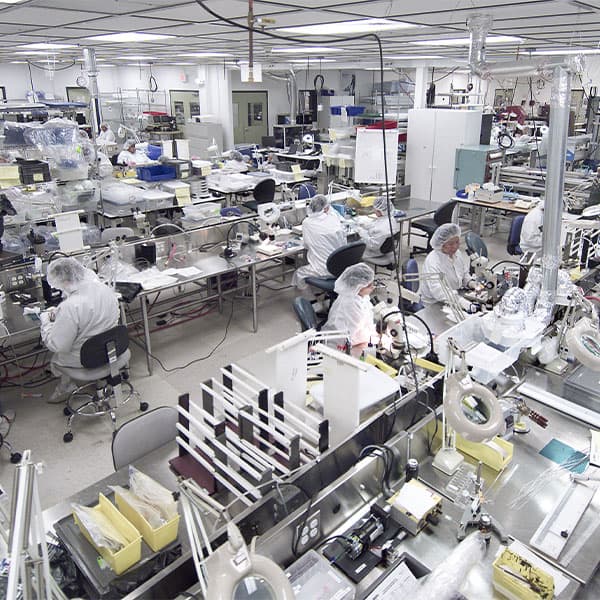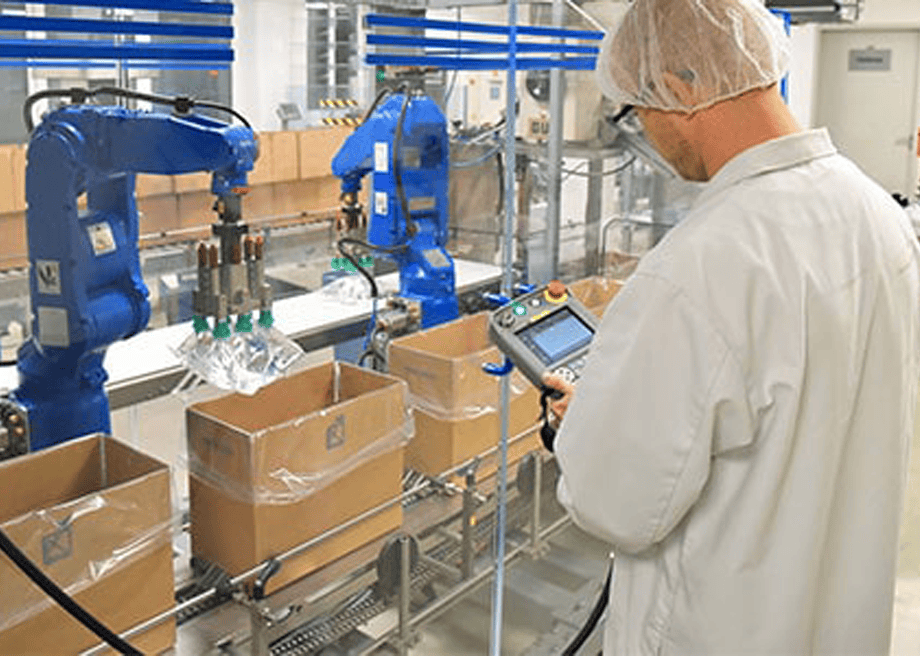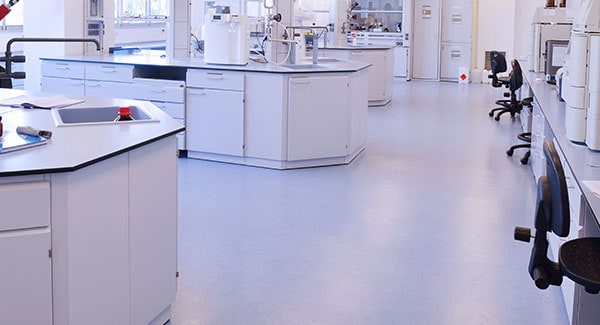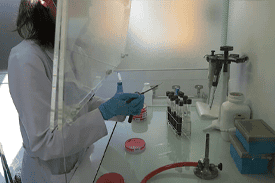
Specialty Floor Coatings for Medical Manufacturing Facilities
Safe, Compliant, and Built to Last
Medical manufacturing demands safe, reliable flooring. A floor coating that fails to meet Joint Commission Standards proves hazardous to employees, and if it resists sterilization, then it puts the entire facility at risk. That’s why choosing the right specialty floor coating is one of the most important decisions you can make for your facility.
Is Your Medical Manufacturing Plant’s Floor Safe?
In medical manufacturing, your floor plays a critical role in protecting every aspect of your operation. The right coating safeguards your process, your products, and your people, quietly working as the hidden safety system under your feet.
Process Safety
To maintain required standards of cleanliness in these conditions, floors, walls, and ceilings require regular attention. So these surfaces need to be easy for your staff members to clean. The best products consist of smooth, hard, and non-porous surfaces, which make cleaning and disinfecting simple.
Besides being easy to clean, floors also have to stay smooth and free of cracks and open joists. If your floor shows signs of wear and tear, it might be time for an inspection by an industrial flooring specialist to see if a new coating is right for you yet.
Product Safety
Coupled with other industry-wide shifts in pharmaceutical manufacturing, heavy regulations appear poised to change the way the industry operates. Observers expect small production companies to start producing low-volume batches of multiple products instead of pumping out mega doses of popular drugs as they’ve done in the recent past.
While it’s probably necessary to remain solvent, this change elevates a company’s overall risk. With more products to manage and more regulations to adhere to, medical manufacturing companies face growing concerns around their ability to maintain safety standards and maximize product reliability.
People Safety
Flooring Safety Guide for a
Medical Supply Manufacturing Facility
The flooring needs of a medical manufacturing plant can grow complex. While worker satisfaction may top the list of concerns, manufacturers have to consider regulatory agency requirements and budgets when choosing which flooring to install and when to upgrade it.
Key needs include:
- Meeting or exceeding current health and safety standards
- Maintaining a clean, professional appearance
- Reducing noise within the facility
- Supporting the building’s overall aesthetic
- Providing comfort for staff on their feet
- Resisting deep stains
- Withstanding significant wear and tear from people and equipment
- Being easy to clean, disinfect, and maintain

Medical-Grade Floor Coating Options
In medical manufacturing, floor coatings must meet strict cleanliness standards, resist damage from chemicals and equipment, and support a safe, efficient workspace. Below are some of the most effective coating options for medical device and supply facilities.

Epoxy Floor Coating
Known for their smooth, seamless finish, epoxy floors are easy to clean and disinfect, which can be essential for maintaining sterile conditions. They offer strong chemical resistance and withstand heavy foot and equipment traffic without cracking or peeling.

Urethane Floor Coatings
Urethane coatings provide excellent durability, abrasion resistance, and tolerance to temperature changes. They are a strong choice for areas exposed to hot water washdowns, frequent cleaning, or thermal cycling.

ESD (Electrostatic Dissipative) Floor Coating
Designed for static-sensitive environments, ESD coatings safely dissipate static electricity to protect delicate electronic components used in many medical devices.

Slip-Resistant Coatings
Slip-resistant finishes reduce the risk of falls in areas where wet cleaning, spills, or sanitizing processes create slick surfaces. They can be combined with other coating types for added safety without sacrificing cleanability.

Extreme Chemical-Resistant Flooring
Built to withstand exposure to harsh chemicals, solvents, and disinfectants, these coatings protect against corrosion and surface degradation in high-intensity cleaning or specialized manufacturing environments.
Costs of Floor Coating for Medical Equipment Manufacturing
Floors usually comprise a fraction of an organization’s construction budget. Nevertheless, given the critical value of floors to process, product, and worker safety, floors might need more consideration.
First, any company considering a new floor should think about durability and sustainability. Floors that last cost less in maintenance and repair over time. Resinous floor coatings such as epoxy and urethane typically provide the practical, durable, reliable, and easy-to-clean surface that medical equipment manufacturers need. Facility engineers and flooring companies also need to consider the environmental regulations surrounding LEED accreditation when choosing a floor coating.
Then, financial factors come into play. At CPC Floor Coatings, we can help you strike the right balance between prioritizing choices that affect safety, production, and regulatory compliance while staying as cost-effective as possible.
At CPC, we use the best products available to get the results you need. Our coating systems are made to last, and our installation process is thorough and correct, every time. We will work with your production schedule to ensure the minimal downtime you need, and many of the processes we use enable us to work dust-free, cutting down installation time considerably.
FAQs
What are the benefits of floor coatings in medical manufacturing plants?
- High-performance floor coatings offer multiple advantages:
- Maintain a sterile, easy-to-clean surface
- Resist damage from heavy equipment and chemicals
- Improve worker safety with slip-resistant and static-control options
- Enhance facility aesthetics and reduce noise
- Extend flooring lifespan, lowering long-term costs
Most facilities should schedule a professional floor inspection at least once a year. The frequency of recoating depends on traffic levels, chemical exposure, and regulatory requirements. Note that most manufacturing floor coatings can last 5–10 years +, but high-use areas may need more frequent attention.
Yes. Many coatings are designed to meet or exceed industry standards for cleanliness, particle control, and safety. Using the right coating can make it easier to pass audits and maintain compliance with FDA, ISO, or other regulatory bodies.
The amount of downtime will depend on the size of the project, the type of coating, and how long it takes to cure. Some fast-curing epoxy systems can handle light traffic within 24 hours and reach full use in 2–3 days. Careful scheduling helps minimize disruption and keep operations running smoothly. Read more in our blog How Long Does Epoxy Take to Dry or Cure?.
Flooring Solutions Built for Medical Manufacturing
Your medical manufacturing facility demands more than just a tough floor; it needs a surface that supports cleanliness, compliance, and worker safety every single day. CPC Floor Coatings can help you achieve all three without compromise.
With over 40 years of experience, we specialize in customized flooring solutions that meet the unique demands of medical manufacturing environments. Serving facilities across the Southeast within a 300-mile radius of Upstate South Carolina, we work closely with each client to recommend coatings that align with their processes, regulatory requirements, and long-term facility goals.
Contact us today to get started. We’ll help you choose a floor coating that’s right for your facility, your workflow, and your budget.




